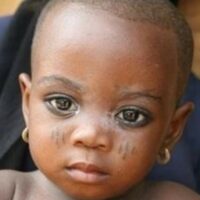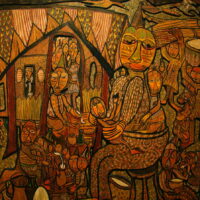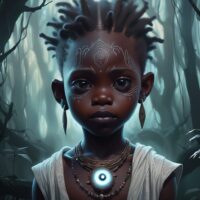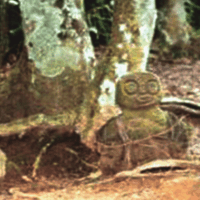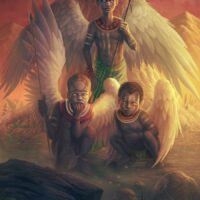Abiku : The Spirit Children
Listen
At a glance
| Description | |
|---|---|
| Origin | Yoruba Mythology |
| Classification | Spirits |
| Family Members | N/A |
| Region | Nigeria, Benin, Togo |
| Associated With | Death, Rebirth |
Abiku
Introduction
In Yoruba mythology, Abiku is one of the most haunting and powerful concepts, embodying the mysterious tension between life and death. The word comes from the Yoruba phrase abi iku, meaning “born to die,” and it refers to spirit children who are fated to die young and return repeatedly through rebirths into the same family. The cycle of birth, death, and reappearance not only devastates mothers but also serves as a symbolic expression of fate, suffering, and the spiritual battle between earthly existence and the unseen world.
Abiku belief is rooted in West African cosmology, particularly among the Yoruba of Nigeria, but it extends into Igbo and other cultures with variations of the same idea. Beyond explaining infant mortality, the Abiku represents spiritual struggle, generational grief, and the thin line that separates the physical from the supernatural. Even today, Abiku continues to shape literature, rituals, and cultural identity, making it one of the most enduring myths of the region.
Physical Traits
Abiku children are believed to carry certain marks or characteristics that distinguish them from ordinary infants. Families often recognize them by unusual physical signs such as ritual scars, delicate beauty, or faint birthmarks. Some are described as appearing otherworldly, with a fragile presence that hints at their short stay in the mortal realm.
Mothers who lose multiple children in succession sometimes scar or mark the body of the deceased child in hopes of identifying it should the spirit return in another birth. When a newborn arrives with those same marks, the family becomes convinced it is the Abiku reborn. In some traditions, these children are also thought to suffer from persistent illness or night terrors, further reinforcing their connection to the spirit world.
The Yoruba also describe Abiku as existing in both the human and spiritual realms simultaneously. This liminal existence can manifest in unusual behaviors like sleepwalking or recounting dreams that resemble journeys to the other world. Such traits blur the boundary between myth and reality, as families wrestle with both grief and the inexplicable.
Family
The relationship between an Abiku and its family is filled with sorrow and ritual negotiation. These children are believed to belong more to their spirit companions in the other world than to their earthly parents. Before birth, they make pacts with their spiritual society, known as Egbe, promising to return quickly after death. This spiritual allegiance is why the child seems indifferent to parental love or pleas to stay.
Mothers often bear the brunt of the suffering, repeatedly nurturing children only to lose them. In response, families turn to ritual practices and naming traditions to persuade the child to remain. Special names like Malomo (“Do not go again”) or Banjoko (“Stay and sit with us”) embody this desperate hope. Foods, charms, and songs are also prepared to entice the Abiku to choose life over death.
Yet despite such efforts, the Abiku often resists. Some traditions describe self-confessed Abikus recounting how they took delight in watching their mothers cry each time they died. These stories underscore the deep pain caused by the cycle and reveal how Yoruba cosmology interprets recurring loss not merely as chance, but as part of a larger spiritual contract.
Other names
While “Abiku” is the most recognized term in Yoruba tradition, there are several other names and variants that reflect similar beliefs across West Africa. In Igbo culture, such children are known as Ogbanje, also considered spirit children who repeatedly die and return to torment their families. Among the Akan people of Ghana, the concept exists as Akwaba, a child believed to visit briefly before returning to the spirit world.
Even within Yoruba culture, Abiku children are given a range of meaningful names that act as both pleas and declarations. Examples include Durosinmi (“Stay and rest”), Kosoko (“There is no hoe,” implying no grave should be dug), and Durojaiye (“Stay and enjoy life”). These names are not ordinary—they are spiritual negotiations, designed to remind the child of its place in the world of the living and the hope that it will resist the pull of the other realm.
Each variant, whether Abiku, Ogbanje, or Akwaba, reflects a pan-African worldview where the premature death of children is explained not as random tragedy, but as a spiritual drama unfolding between two worlds.
Powers and Abilities
Abiku are not simply helpless victims of fate; they are also understood as powerful spiritual beings with extraordinary abilities. Their defining power is reincarnation—the ability to return to the same family repeatedly, defying normal cycles of life and death. This cyclical power makes them both feared and respected.
They are also believed to communicate with spirits, deliver cryptic prophecies, and influence the dreams of their families. Some traditions describe Abiku as resistant to ordinary rituals, requiring powerful charms or the intervention of a diviner to break their pact with the Egbe. Their abilities extend to emotional manipulation, often feeding on the grief and desperation of their parents.
Folklore also attributes supernatural traits to them: invisibility to human eyes, sudden disappearances resembling teleportation, and uncanny intuition about future events. In some accounts, only iron can harm an Abiku, emphasizing the protective role of Yoruba talismans made with iron or copper. These details highlight the complexity of the Abiku figure—as both a symbol of loss and a supernatural entity with agency.
Modern Day Influence
Despite advances in medicine and changing cultural perspectives, belief in Abiku remains deeply ingrained in parts of Nigeria and West Africa. Studies in regions like Ondo and Ekiti show that many families still attribute repeated childhood deaths to Abiku spirits, often seeking traditional remedies alongside or instead of modern healthcare. This persistence shows how spiritual explanations continue to shape health practices and worldviews.
The influence of Abiku also extends into modern literature and art. Nigerian writers such as Wole Soyinka and Ben Okri have immortalized the concept in global literature. Soyinka’s poem Abiku captures the haunting voice of the spirit child, while Okri’s celebrated novel The Famished Road reimagines the Abiku as a metaphor for Nigeria’s postcolonial struggles. For Okri, the Abiku represents both suffering and the potential for renewal, navigating between tradition and modernity.
In visual arts, the image of the Abiku appears in haunting portraits, sculptures, and installations, often symbolizing fragility, resilience, or cycles of trauma. Nollywood films and African music also draw on Abiku stories, using them as metaphors for resilience, generational struggle, or social instability.
In diasporic contexts, Abiku resonates with themes of migration and displacement, where the spirit child symbolizes the struggle of living between worlds—belonging everywhere and nowhere. This has made the Abiku figure a rich metaphor not just for mortality, but for identity and cultural survival in a globalized world.
Related Images
Source
Oriire. (n.d.). Abiku: The Yoruba concept of spirit children. Oriire. Retrieved August 16, 2025, from https://www.oriire.com/article/abiku-the-yoruba-concept-of-spirit-children
Mythology Worldwide. (n.d.). The Yoruba Abiku: The spirit-children of West Africa. Mythology Worldwide. Retrieved August 16, 2025, from https://mythologyworldwide.com/the-yoruba-abiku-the-spirit-children-of-west-africa/
Abimbola, W. (1976). Ifá: An African divination system. New York: NOK Publishers.
Soyinka, W. (1967). Abiku. In Idanre and Other Poems. London: Methuen.
Okri, B. (1991). The Famished Road. London: Jonathan Cape.
Bascom, W. (1969). Yoruba Religion and Medicine in Ibadan. Berkeley: University of California Press.
Drewal, H. J., & Drewal, M. T. (1983). Gelede: Art and Female Power among the Yoruba. Bloomington: Indiana University Press.
Falola, T., & Genova, A. (2006). Yoruba Identity and Power Politics. Rochester, NY: University of Rochester Press.


